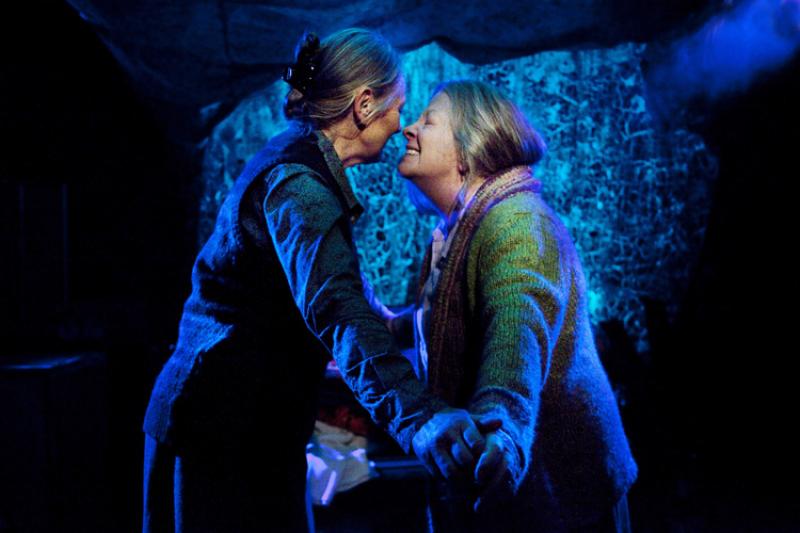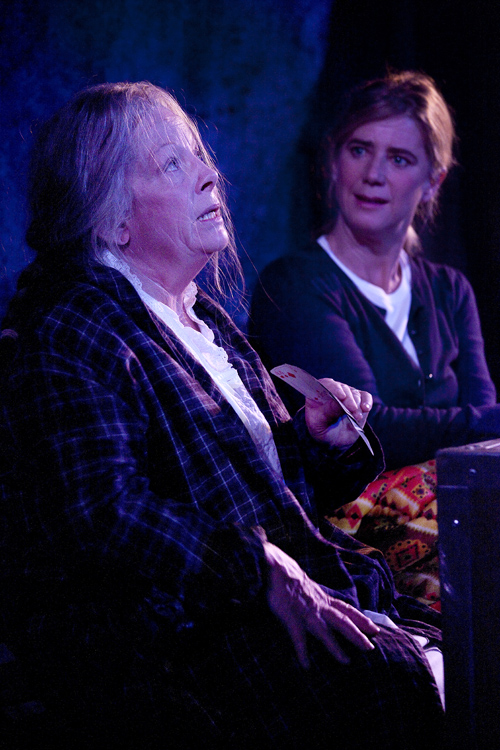Salt, Root and Roe, Trafalgar Studios | reviews, news & interviews
Salt, Root and Roe, Trafalgar Studios
Salt, Root and Roe, Trafalgar Studios
New writing confronts the demons of old age without flinching

Many dramatists have taken their turn putting faces to Thoreau’s lives of “quiet desperation”. But the challenge in what Thoreau goes on to conclude – that it is therefore a mark of wisdom and the wise to avoid acts of desperation – has been taken up by far fewer. Salt, Root and Roe sees Tim Price transform an act of violence from one of apparently senseless desperation to one of humane intelligence and generosity.
We open in the womb of a Welsh limekiln; two elderly sisters trade memories of childhood, connected by an umbilical cord of skipping rope. Iola (Anna Calder-Marshall) and Anest (Anna Carteret) are in their seventies, have outlived a father and husband, and live alone in a remote part of the coast. A suicide letter summons Anest’s daughter Menna (Imogen Stubbs) home, and together the women struggle to live, love and communicate with one another.
The playwright himself never allows the cadence of language to distract from the insistent dissonance of its content
Pirie’s direction has a balletic beauty to it, highlighting the synchronised rituals of eating and being that bind Iola and Anest in physical harmony. Currents of conflicting emotions ebb and eddy around the three women, waves breaking, transforming and turning back on themselves like the sea that has dominated their lives. While Price’s text, in a rare moment of levity, speaks of the Welsh folk songs whose lovely melodies hide tragedy, there’s little such euphemising in his own writing. Pirie might soften gesture, but the author himself never allows the cadence of language to distract from the insistent dissonance of its content.
 The indignity of dementia takes form by turns horrifying and heartbreaking in Calder-Marshall’s Iola (pictured right, with Stubbs as Menna). Disarming us initially with eccentricity (a mobile phone meets a watery end in the teapot) and biddable absent-mindedness, Calder-Marshall’s carefully controlled subsiding into desperation is no less tragic for all its ugliness. Vomit spews forth unbidden from her, and language only a little less foul breaks into her dealings with her beloved family.
The indignity of dementia takes form by turns horrifying and heartbreaking in Calder-Marshall’s Iola (pictured right, with Stubbs as Menna). Disarming us initially with eccentricity (a mobile phone meets a watery end in the teapot) and biddable absent-mindedness, Calder-Marshall’s carefully controlled subsiding into desperation is no less tragic for all its ugliness. Vomit spews forth unbidden from her, and language only a little less foul breaks into her dealings with her beloved family.
Iola’s defiance (“I’ve killed bulls; I can sit on some bloody sand”) is set against the control and introversion of Carteret as Anest. Her sanity and reasoned kindness, so inexplicable at the start, become the compass of the piece, as we along with Menna swivel and swing in our attempt to find the moral north.
Stubbs’s Menna is all neurotic flinches and tension, but while it’s a tender performance (particularly sympathetic in scenes with Roger Evans as local policeman Gareth), the broken connection at the core of the character is evident and bravely ugly; she unsettles the instinctual rhythms of mother and aunt, struggling against nature with the most natural and misguided intentions in the world.
Language – the Welsh shared by the sisters, the halting attempts of Menna to speak and understand – underpins the drama of Price’s relationships, but amid all this talk of “untranslatable” words we come to understand that the greater act of translation here lies between the languages of youth and old age, for whom death, suffering and love mean very different things.
Pirie is the first in a series of the Donmar’s Resident Assistant Directors to benefit from the theatre’s current residency at Trafalgar Studios, and Salt, Root and Roe will be followed shortly by Conor McPherson’s Dublin Carol directed by Abbey Wright, and Paul Hart’s take on Sartre’s Huis clos. It’s a confronting start to the season, a polemic that gets off its podium and wanders among the driftwood of family and memory: the domestic legends and myths that bind us to our relations and our lives. A merman father “borrowed from the sea”, babies delivered in a lobster pot, a preference for marmalade; all these add up to Price’s “infinite chaos of human desire” – no small equation to balance dramatically.
- Salt, Root and Roe at the Trafalgar Studios until 3 December
rating
Explore topics
Share this article
The future of Arts Journalism
You can stop theartsdesk.com closing!
We urgently need financing to survive. Our fundraising drive has thus far raised £49,000 but we need to reach £100,000 or we will be forced to close. Please contribute here: https://gofund.me/c3f6033d
And if you can forward this information to anyone who might assist, we’d be grateful.

Subscribe to theartsdesk.com
Thank you for continuing to read our work on theartsdesk.com. For unlimited access to every article in its entirety, including our archive of more than 15,000 pieces, we're asking for £5 per month or £40 per year. We feel it's a very good deal, and hope you do too.
To take a subscription now simply click here.
And if you're looking for that extra gift for a friend or family member, why not treat them to a theartsdesk.com gift subscription?
more Theatre
 Othello, Theatre Royal, Haymarket review - a surprising mix of stateliness and ironic humour
David Harewood and Toby Jones at odds
Othello, Theatre Royal, Haymarket review - a surprising mix of stateliness and ironic humour
David Harewood and Toby Jones at odds
 Macbeth, RSC, Stratford review - Glaswegian gangs and ghoulies prove gripping
Sam Heughan's Macbeth cannot quite find a home in a mobster pub
Macbeth, RSC, Stratford review - Glaswegian gangs and ghoulies prove gripping
Sam Heughan's Macbeth cannot quite find a home in a mobster pub
 The Line of Beauty, Almeida Theatre review - the 80s revisited in theatrically ravishing form
Alan Hollinghurst novel is cunningly filleted, very finely acted
The Line of Beauty, Almeida Theatre review - the 80s revisited in theatrically ravishing form
Alan Hollinghurst novel is cunningly filleted, very finely acted
 Wendy & Peter Pan, Barbican Theatre review - mixed bag of panto and comic play, turned up to 11
The RSC adaptation is aimed at children, though all will thrill to its spectacle
Wendy & Peter Pan, Barbican Theatre review - mixed bag of panto and comic play, turned up to 11
The RSC adaptation is aimed at children, though all will thrill to its spectacle
 Hedda, Orange Tree Theatre review - a monument reimagined, perhaps even improved
Scandinavian masterpiece transplanted into a London reeling from the ravages of war
Hedda, Orange Tree Theatre review - a monument reimagined, perhaps even improved
Scandinavian masterpiece transplanted into a London reeling from the ravages of war
 The Assembled Parties, Hampstead review - a rarity, a well-made play delivered straight
Witty but poignant tribute to the strength of family ties as all around disintegrates
The Assembled Parties, Hampstead review - a rarity, a well-made play delivered straight
Witty but poignant tribute to the strength of family ties as all around disintegrates
 Mary Page Marlowe, Old Vic review - a starry portrait of a splintered life
Tracy Letts's Off Broadway play makes a shimmeringly powerful London debut
Mary Page Marlowe, Old Vic review - a starry portrait of a splintered life
Tracy Letts's Off Broadway play makes a shimmeringly powerful London debut
 Little Brother, Soho Theatre review - light, bright but emotionally true
This Verity Bargate Award-winning dramedy is entertaining as well as thought provoking
Little Brother, Soho Theatre review - light, bright but emotionally true
This Verity Bargate Award-winning dramedy is entertaining as well as thought provoking
 The Unbelievers, Royal Court Theatre - grimly compelling, powerfully performed
Nick Payne's new play is amongst his best
The Unbelievers, Royal Court Theatre - grimly compelling, powerfully performed
Nick Payne's new play is amongst his best
 The Maids, Donmar Warehouse review - vibrant cast lost in a spectacular-looking fever dream
Kip Williams revises Genet, with little gained in the update except eye-popping visuals
The Maids, Donmar Warehouse review - vibrant cast lost in a spectacular-looking fever dream
Kip Williams revises Genet, with little gained in the update except eye-popping visuals
 Ragdoll, Jermyn Street Theatre review - compelling and emotionally truthful
Katherine Moar returns with a Patty Hearst-inspired follow up to her debut hit 'Farm Hall'
Ragdoll, Jermyn Street Theatre review - compelling and emotionally truthful
Katherine Moar returns with a Patty Hearst-inspired follow up to her debut hit 'Farm Hall'
 Troilus and Cressida, Globe Theatre review - a 'problem play' with added problems
Raucous and carnivalesque, but also ugly and incomprehensible
Troilus and Cressida, Globe Theatre review - a 'problem play' with added problems
Raucous and carnivalesque, but also ugly and incomprehensible

Add comment